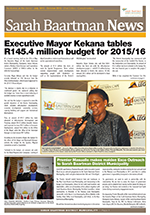NMMU recognises reality of the ‘missing middle’
NMMU is assisting students who do not qualify for National Student Financial Aid Scheme (NSFAS), because they are not deemed ‘poor enough’, but who still cannot afford to pay their school fees.
These students are categorised as the ‘missing middle’ within the institution, as they are stuck in-between a financial blunder. Due to this, NMMU has assisted these respective students to overcome this issue.
Inam Pinyana, 22, grew up in the deep rural village of Mhleleni, near the town of Tabankulu, in the former Transkei.
His mother, an Adult Basic Education and Training (ABET) educator, is the sole provider in the village home he shared with his brother and about eight cousins, whose parents are either unemployed or deceased.
Since his mother earns reasonably well in her job, relative to others in the same and neighbouring rural areas, Pinyana has been deemed not poor enough to qualify for the National Student Financial Aid Scheme (NSFAS) but his family is not wealthy enough to pay for his studies.
Pinyana has inadvertently become part of a growing number of South African students who constitute what has become colloquially called the “missing middle”.
As a second-year Radiography student at Nelson Mandela Metropolitan University, Pinyana has applied successfully to have his outstanding study debt from 2015 deferred, and no longer needs to pay his registration down payment up front. His University has made this much possible.
“You cannot imagine how I felt [upon] hearing such good news. It was a relief in my heart. My mother screamed when she heard the news.”
The debt clocked up from a year of electrical engineering studies in 2013 had been covered by a loan, which also covered his registration last year, but there had been no additional money to pay for his first year of Radiography studies last year.
NMMU Council and Management Resolve and Dedication
The resolve to look into debt situation and funding challenges experienced by students at NMMU and other South African universities followed massive and heroic local and national protest action led and mobilized by and through a broad-based #FeesMustFall student movement and related campaign.
Having listened to demands articulated by NMMU workers and students, spearheaded by various student formations including the SRC, the Council, the Vice-Chancellor and Management Committee resolved that it cannot be that academically deserving but financially challenged student are denied the opportunity of obtaining a tertiary qualification, simply because they happen to be from poor communities.
“Student debt has intensified as families feel the pressure of the economy, especially when the fee levels and cost of higher education keep on rising. We need to do what we can to help. Our interventions will result in belt-tightening for 2016, 2017 and possibly 2018 but we will have to make do with the resources we have and find new resources,” NMMU Vice-Chancellor Prof Derrick Swartz shared with staff late last year.
The debt and down payment relief is one of several innovative initiatives introduced by the University. It is an intervention that NMMU implemented in November last year in the aftermath of the #FeesMustFall demands, and which has since been tweaked during wide consultation sessions with various student groups to ensure all-round agreement with the criteria.
To date more than 5 000 students have applied for debt and down payment relief at NMMU with more than 90% of them being successful. An appeals process is in place for those who are initially turned down.
Though Pinyana’s application was successful and he is able to study, his financial worries are far from over: “Even now I am struggling with the money for transport from Provincial Hospital [where he is “staying by grace” in the student nurses’ home] to NMMU, and next week my lectures begin.” His mother, who is under administration, gives him money for food when she can, but he also relies on the food parcels given to financial needy students by NMMU’s on-campus clinic, and has to borrow textbooks.
Missing middle
Attending to the realities of the “missing middle” – the children whose household income extends up to R300 000 and has several dependents – is a phenomenon the Government has recognized too. It hopes to introduce its own short, medium and long-term steps to support this sector. Its funding model will be tested in the 2017 academic year for full implementation in 2018.
Appeals process
In terms of NMMU’s appeals process for debt and down payment relief, the panel comprising management and student representative will consider case by case the circumstances of those whose income is not more than R399 000 in terms of financial means, and look well beyond the students’ most recent marks in order to arrive at a fair outcome.
The objective of the exercise for students and management, is as much about broadening access, as it is about ensuring that those truly deserving, particularly in terms of their academics, are not disadvantaged by virtue of being of lesser means.
The appeal panel consists of #FeesMustFall student leaders, SRC members, finance and academic curriculum experts to ensure all-round representation and appropriate expertise.
Present status
In the interim, the government’s National Student Financial Aid Scheme (NSFAS) is not yet able to meet the needs of those who are eligible (whose combined family income is less that R124 000 per annum). Of the 7 315 who applied for NSFAS funding at NMMU, only 3 036 were successful and received funding. A further 2 780 were successful but NSFAS did not have enough funding for them.
Like other universities, NMMU is awaiting news as to how much of the extra R6.2bn it will receive from NSFAS in terms of clearing historic debt. In NMMU’s case, the amount is presently R21.3m, brought down from R85m late last year.
Funding issues
When President Jacob Zuma committed to a no-fee increase at universities in 2016, it meant that NMMU had to pick up 70% of the difference between the 0% increase and the 9% increase the University had planned.
The Higher Education system relies on two sources of income – government subsidy and student fees. But since 1994, the Government’s portion has declined forcing universities to raise fees to make up the difference in order to run their institutions.
Furthermore, since 1994 student numbers have more than doubled from 440 000 to 990 000.
A commission is looking at the fees subsidy issue and alternative funding models but none of these interventions are likely to immediately positively impact on the present status. Instead, universities will have to seek their own solutions in meeting the financial gap.
The financial challenges facing universities are further compounded by the outsourcing issue.
In line with our charter of values, NMMU is also working hard to re-absorb the currently outsourced service functions and staff, namely, Cleaning, Catering, Gardening, Window cleaning and Security. Now that we are acutely aware of the exploitative and inhumane working conditions, seen largely in low wages, inadequate or no benefits, and the casualization of menial work, the University cannot continue to outsource service labour. The University has offered to raise the minimum wage levels at R5 000 cost to company, and have extended study and clinic benefits to staff currently employed by outsourced companies.
Other initiatives
NMMU has committed to ensuring that all academically-deserving but financially challenged students will not be turned away. It has committed that through good governance, belt-tightening and increased efforts to raise further funds via third-stream income and other fund-raising initiatives, to do its bit.
Annually, the University recovers up to 93% of its debt and so its historic debt level – though still high – is far lower than most other universities. NMMU is presently owed R4.3m debt by NSFAS students dating back to 2013 or R21.3m all told.
This figure will rise rapidly with its present initiative to get those unfunded NSFAS and “missing middle” students into the system via its debt relief and down payment opportunity.
The University has established various management working groups to examine how to save funds and grow resources. It has also frozen all professional support service posts in order to conduct an audit with the end goal of seeking savings through the cutting of posts and restructuring.
Image: Inam Pinyana, 22
Related Stories
Transnet Port Terminals’ East London terminals are set to...
An 80-year old has died, while two others have...
The South African Nuclear Energy Corporation (Necsa) and...
The Sarah Baartman District Municipality on the 29th...
The Chevrolet Warriors earned an exciting 14-run win against...
Dumisani Gwala is the rhino poaching kingpin you’ve...
The Nelson Mandela Bay Ratepayers Association (NMBRA), led by Chairperson, Kobus Gerber, on Friday opened a case of theft, money laundering and corruption against Access Management...
Eastern Province Rugby President, Cheeky Watson, has dodged another...
The South African Weather Service has issued a number...
It’s back to school time – and back to the...

















